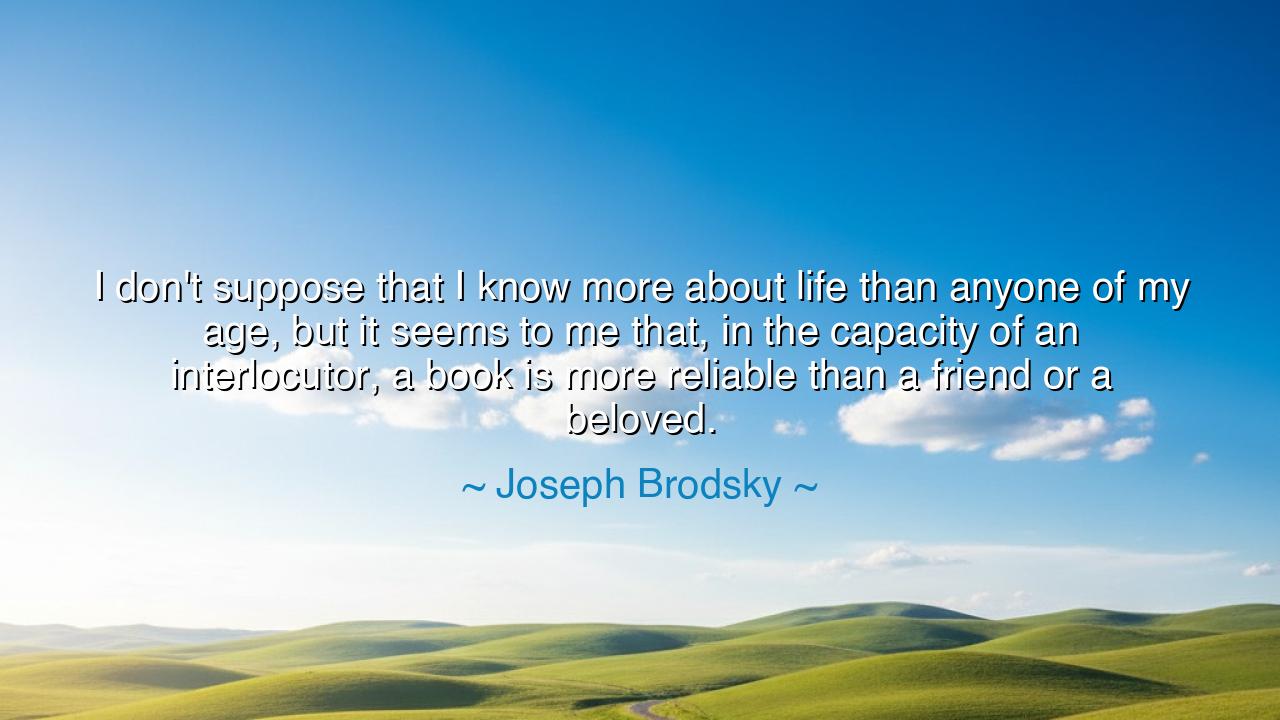
I don't suppose that I know more about life than anyone of my
I don't suppose that I know more about life than anyone of my age, but it seems to me that, in the capacity of an interlocutor, a book is more reliable than a friend or a beloved.






"I don't suppose that I know more about life than anyone of my age, but it seems to me that, in the capacity of an interlocutor, a book is more reliable than a friend or a beloved." These words by Joseph Brodsky invite us to reflect on the power and reliability of the written word, especially when compared to the transient and sometimes imperfect nature of human relationships. In a world where friendships and love are often bound by emotions, time, and circumstance, Brodsky suggests that books, as silent and steady interlocutors, offer something more enduring—wisdom and clarity that are not subject to the fluctuations of mood or the imperfections of human connection.
At the heart of Brodsky's reflection is the notion of dependability. While friends and lovers may offer solace, counsel, and companionship, they are also prone to misunderstandings, betrayals, and the vicissitudes of life. A book, on the other hand, remains constant. Its words, once written, do not change with the passing of time. The author’s thoughts are preserved, offering a stable source of guidance, much like a wise elder whose words carry through the ages. Just as Plato’s dialogues have continued to inspire and provoke thought for centuries, so too do the great works of literature remain reliable interlocutors—always available to offer clarification when the world around us feels chaotic or uncertain.
Consider the example of Marcus Aurelius, the Roman Emperor whose Meditations have endured for over two millennia. Though a ruler, he was deeply aware of his own imperfections and sought solace in his writings. His reflections were not born out of isolation, but from his struggles to live a virtuous life amid the tumultuous demands of leadership. In this way, his words became a silent companion to those who sought guidance, offering reliable counsel in a world filled with uncertainty. Just as Marcus found solace in his own writings, so too does Brodsky suggest that we might find something uniquely dependable in the written word, which is not susceptible to the fluctuations of our human emotions or relationships.
This trust in the written word contrasts sharply with the limitations of human relationships. Friendships, however genuine, are often subject to misunderstanding and disappointment, while romantic relationships can be fraught with passion, jealousy, and conflict. Human connection is deeply valuable, yet it is also marked by its ephemerality—our moods, our desires, and our understandings evolve, often making it difficult to maintain the stability we seek in times of hardship. A book, on the other hand, remains fixed. It offers a kind of eternal conversation, where the ideas expressed are not altered by time or personal bias. In this sense, it provides a clarity and reliability that can sometimes be lacking in our interpersonal exchanges.
This reliability is particularly crucial when facing life's uncertainties. When Socrates was condemned to death by the very city he had served, he turned to the teachings of philosophy—not just in theory, but as a means to confront his own mortality. The written word in this instance was a constant source of wisdom, a way to find peace in the face of injustice. Similarly, Brodsky understood that in moments of self-reflection or existential crisis, it is not always the counsel of others that will provide us with the answers we seek, but rather the still, immutable voice of literature. In the pages of a book, we find an interlocutor who is always present, always prepared to offer guidance when the world around us seems uncertain or fleeting.
The lesson here, then, is to recognize the value of literature as both a companion and a teacher. Books provide a form of reliability that human relationships, with all their complexity and unpredictability, often cannot. In times of uncertainty, we must seek out those works that offer wisdom, clarity, and strength—texts that have stood the test of time and continue to speak to us across generations. Brodsky’s words urge us to trust in the wisdom of those who came before us, knowing that through books, we can find answers, not just for our minds, but for our hearts.
In practical terms, we should cultivate a habit of reading not only for entertainment or intellectual growth but also as a means to nourish the soul. By turning to literature in moments of confusion, we align ourselves with the enduring wisdom of those who have already navigated the difficulties of life. Whether through philosophy, history, or fiction, books offer us perspectives that help us understand ourselves and our place in the world. This constant companionship offers a kind of stability and reliability that should never be underestimated.
In conclusion, Joseph Brodsky’s reflection serves as a reminder that books, while not substitutes for human connection, offer a unique and timeless kind of companionship. In their pages, we can find a reliable interlocutor—a source of wisdom that is unaffected by the capricious nature of human relationships. Let us, then, seek out those texts that challenge, inspire, and guide us, knowing that the written word can be a steady hand in the chaos of life. By embracing literature as a reliable source of knowledge, we ensure that we are never truly alone, even in our darkest moments.






AAdministratorAdministrator
Welcome, honored guests. Please leave a comment, we will respond soon